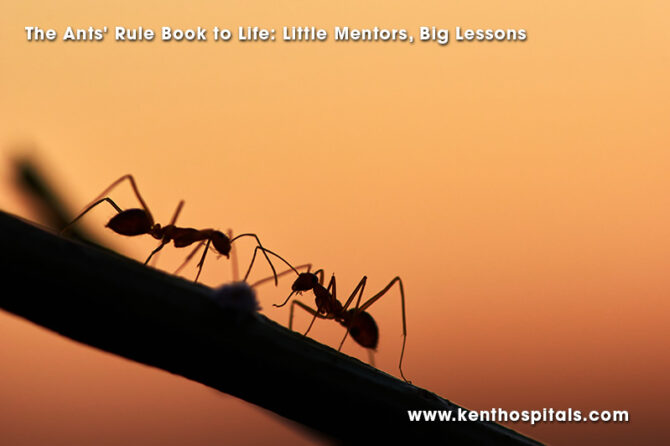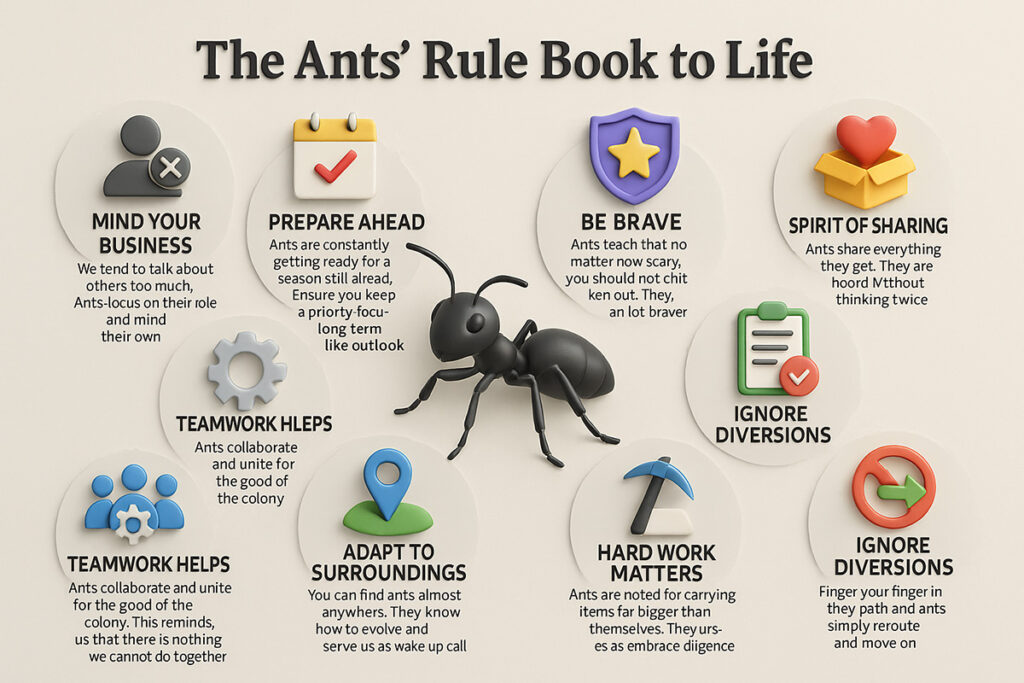
If we are keen observers and love nature, we can learn a lot from the smallest creatures like ants. Despite being evolved beings with intelligence and awareness, humans often overlook the deep wisdom embedded in nature’s microcosm. Ants, though minuscule, are nature’s silent philosophers—living examples of discipline, diligence, adaptability, and community. As long as we keep an open mind and remain willing to learn, these tiny beings can offer life lessons that surpass volumes of self-help books.
Be Brave: Courage in the Face of Adversity
Ants are constantly up against odds bigger than themselves. They fight predators, wade through floods, and surmount huge hurdles in proportion to their size but never back down. Not because they are not afraid but because in their natural programming, the inclination is not to back down but to move ahead. They neither dither nor overthink about threats but move on with intention. This demonstrates for us that courage is not large actions but simple persistence often. Franklin D. Roosevelt so eloquently stated, “Courage is not the absence of fear, but rather the judgment that something else is more important than fear.” Likewise, in the Bhagavad Gita, Lord Krishna exhorts Arjuna to move beyond fear and battle his dharma, as much as the ant moves ahead on its mission without retreat.
Prepare in Advance: The Intelligence of Anticipation
Perhaps the most wonderful of ants’ abilities is the instinctual preparation for the future. During the entire summer, the ants stock their stores for the winter, practicing the virtue of foresight. They remind us that life is cyclical and preparation in plenty assures survival in lean times. This sense of wisdom is repeated in Indian festivals of agriculture such as Makar Sankranti and Pongal where the festivals are celebrated for the harvests and the farmers’ foresights. We tend to delay in making plans in our own lives and take the good times for granted. The ant here instructs us that preparation is not pessimism but prudence.
Mind Your Business: The Art of Focus
Ants never engage in gossip or surmization. They are entirely dedicated to their work, never getting into others’ business. This is a virtue not very prevalent in human society where the tendency is to fall into meaningless talks, judging stance, and comparison. Place a family or a company where one and all of us would just do our own part sincerely and not interfere—such a place would thrive automatically. In the ancient Indian religious document, the Bhagavad Gita, the same philosophy has been emphasized: “You have a right to perform your duties, but not to the fruits of your actions.” The ant follows the same philosophy, caring for its work with single-minded attention and detachment.

Sense of Discipline: Structure Without Supervision
What is most fascinating about ant colonies is their discipline. Thousands of ants move in synchronized lines, follow duties, and maintain order—without any apparent commander giving instructions. This kind of self-governed discipline is rare, even in human systems governed by rules and leadership. It shows us that true discipline is internal. Whether it’s a spiritual seeker following a daily sadhana or a sportsperson training without applause, the power of quiet consistency is transformative. As the saying goes, “Discipline is doing what needs to be done, even when no one is watching.”
Benefits of Teamwork: The Power of Collectiveness
Ants know a secret we tend to forget: the efficacy of teamwork. Whether for constructing anthills or moving objects times their body weight in food, ants labour in concert. At times of flooding, they connect their bodies to create rafts and save their queen and brood. That is teamwork in the grandest sense—both in practice and in ethos. Lord Rama in the Ramayana could not have captured Lanka without the assistance of his friends. In life, magnificent achievements—be they in science, commerce, or social change—are not lone efforts. They are the result of teamwork, synchronization, and unity of purpose.
Adjust to Environment: Succeed in Your Surroundings
Ants are one of the most adaptable beings on the planet. Whether desert, rainforest, urban kitchen, or mountain trail, the ant endures and succeeds. They never fret about change—they adjust to it. In a world where nothing is static—economies, technologies, even our very lives—adjustability is the ultimate superpower. Chanakya, the Indian grand strategist, counselled leaders to rule like grass that flexes in the gust but doesn’t snap. Similarly, the ant demonstrates for us flexibility doesn’t equal weakness—flexibility equals wisdom.
Hard Work Pays: Not a Job Too Big
If there is one characteristic of an ant, it is tireless labour. They can lift objects many times their body weight, not by sheer strength of arms, but by virtue of obstinacy. They do not stop to consider the task is “too much.” They merely do it. In our culture of ease over exertion, ants remind us progress results from steady, honest labour. As American coach Tim Notke observed, “Hard work beats talent when talent doesn’t work hard.” The ant complains not—it merely perseveres.
Ignore Distractions: Remain Focused, Move Ahead
When there is an impediment in the ant’s path—a finger, a stone, a water drop—it doesn’t rage with tantrums. It adapts another path and keeps going. Blame, rage, and reasoning are not wasted on such occasions. This is the teaching in attentiveness and emotional management. Contemporary life is replete with distractions: gossip, television, ego wars. The ant directs us to move ahead, not losing the objective in temporary holdups. In meditation as well, the yogi learns not to retain thoughts like clouds and come back to attention. Likewise in life, distractions are a given; the way one reacts to them determines one’s path.
Spirit of Sharing: Abundance in Action
While humans are not accumulators by nature, ants are not accumulators either. If one ant discovers food, it goes back to lead the others. Everything is shared in the colony—labour, sustenance, shelter. There is no “mine” and “yours.” This sense of cooperation is becoming a rarity in our selfish world. Back in India, hospitality is the emphasis—in short, Atithi Devo Bhava (The guest is divine). The notion of sharing is such a part of our festivals and traditions. Buddha so eloquently said, “Happiness never decreases by being shared.” The ant lives by this wisdom daily, creating abundance with collaboration.
Final thought: Small Teachers, Eternal Truths
Out of the earth under our feet, these tiny creatures teach us a gigantic lesson in meaningful living. Ants illustrate for us that success is not the product of genius but of discipline, of teamwork, of courage, and of regularity. Ants work in silence, labour in unselfishness, and toil without end. They neither look for fame nor fortune but flourish nonetheless. Maybe it is time for us to look down—not with scorn but with awe.
The next time you see an ant, resist the impulse to brush it away. Instead, pause and reflect. In its humble gait and tireless trail lies the distilled wisdom of life. Let the ant be your mentor—not loud, but wise; not fast, but focused; not grand, but deeply grounded. Then let us follow the ant’s path—in silence, steady and resolute footsteps.
Dr. Prahlada N.B
MBBS (JJMMC), MS (PGIMER, Chandigarh).
MBA in Healthcare & Hospital Management (BITS, Pilani),
Postgraduate Certificate in Technology Leadership and Innovation (MIT, USA)
Executive Programme in Strategic Management (IIM, Lucknow)
Senior Management Programme in Healthcare Management (IIM, Kozhikode)
Advanced Certificate in AI for Digital Health and Imaging Program (IISc, Bengaluru).
Senior Professor and former Head,
Department of ENT-Head & Neck Surgery, Skull Base Surgery, Cochlear Implant Surgery.
Basaveshwara Medical College & Hospital, Chitradurga, Karnataka, India.
My Vision: I don’t want to be a genius. I want to be a person with a bundle of experience.
My Mission: Help others achieve their life’s objectives in my presence or absence!
My Values: Creating value for others.
Leave a reply
















*Dear Dr. Prahlada N.B Sir,*
Your blog post, *The Ants' Rule Book to Life: Little Mentors, Big Lessons,* is a treasure trove of wisdom, drawing valuable lessons from the smallest of creatures. Like a masterful storyteller, you've woven together anecdotes, similes, and analogies that make the complexities of life seem manageable and inspiring.
Your comparison of ants to *nature's silent philosophers* resonates deeply. Just as ants work tirelessly, demonstrating discipline, diligence, and adaptability, we too can apply these principles to our lives. The ant's ability to prepare for the future, focus on its work, and work in teams is a testament to the power of collective effort and discipline.
*The lessons you've drawn from ants* are both profound and practical. For instance, the ant's courage in the face of adversity is a powerful reminder that bravery is not the absence of fear but the judgment that something else is more important. Similarly, the ant's ability to adapt to its environment teaches us the importance of flexibility in an ever-changing world.
*Your writing style* is engaging, and your use of quotes from various sources, such as the Bhagavad Gita and Franklin D. Roosevelt, adds depth and context to the lessons you've drawn from ants. Your ability to weave together stories, quotes, and anecdotes makes the post a compelling read.
*Thank you Sir,* for sharing your insights and wisdom with us. Your post is a reminder that even the smallest creatures can teach us valuable lessons about life, discipline, and teamwork. We're grateful for your thought-provoking writing and look forward to reading more from you.
Reply